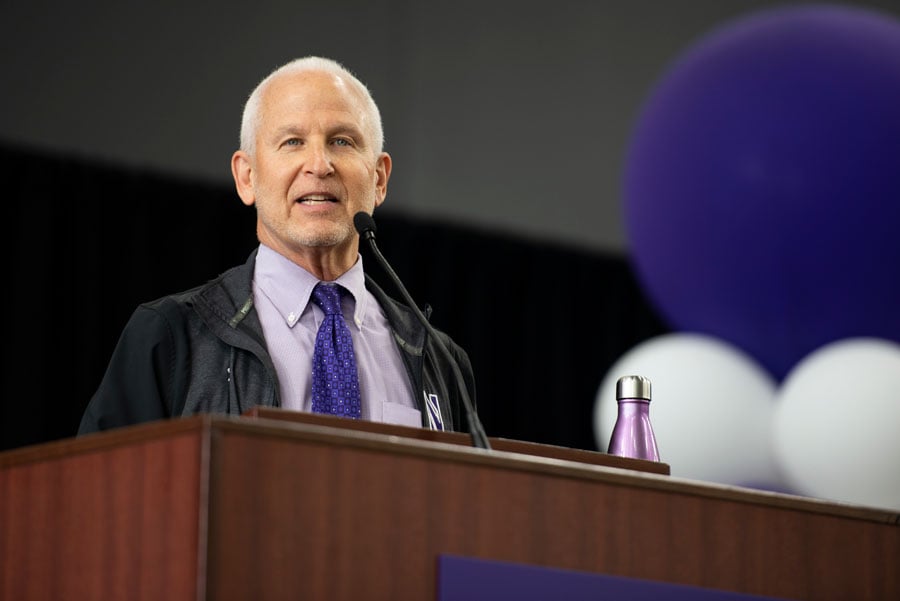Administration does not commit to defunding UP in Community Dialogue
Daily file photo by Evan Robinson-Johnson
University President Morton Schapiro. When asked about police violence against student protesters, he said students also engaged in violent tactics.
November 19, 2020
Two days after the release of the University Police budget report, senior administrators responded to student questions and concerns in a virtual dialogue. Administrators made no commitments to defund the department and reallocate funds to campus mental health resources.
“We have a plan to begin those conversations to find out what that would look like,” said Craig Johnson, senior vice president for business and finance, when asked directly if the University was planning to defund UP.
Wednesday’s Community Dialogue was the second of its type this quarter, organized by Associated Student Government for students to hear their questions answered directly by the administration. Started during the 2015-16 academic year, Community Dialogues were largely created through the work of Black student activists who wanted to increase “transparency” and “accountability” from the administration, moderators said.
In both Wednesday’s dialogue and the one in late October, conversations primarily surrounded student calls for the abolition of UP and abolitionist protests led by NU Community Not Cops.
The student moderators — Daniel Rodriguez, ASG’s executive officer of justice and inclusion; Mari Gashaw, For Members Only’s coordinator and Karina Karbo-Wright, ASG’s chair of social justice education and recruitment — traded off asking questions submitted by students, oftentimes following up in attempt to get more specific information from the administration.
The chat function, which students used in the previous Community Dialogue to ask questions and react to administrators’ answers, was disabled on Wednesday. The Daily was told this was requested by senior administration.
With much of the event focused on UP and its newly released budget, the panel included Feinberg Prof. Clyde Yancy, chair of the Community Safety Advisory Board, which is responsible for looking at the UP budget and operations and recommending a path forward.
Yancy said the board is starting with a “clean slate” when looking at policing on campus, and in terms of defunding UP they “can’t make that statement now.” Other administrators, including Johnson and VP for Student Affairs Julie Payne-Kirchmeier, agreed decisions about budgeting were still yet to be made.
Bringing in opinions voiced in the Q&A, Rodriguez pointed out some student concerns with the administrators’ positions.
“This idea of beginning conversations… students have been doing that work for years,” Rodriguez said. “The police (are) impacting Black and brown students and their mental health… You would have to defund and disband NUPD if you were serious about mental health.”
In addition to conversations about the budget, administrators were asked if they condoned the deployment of officers from the Northern Illinois Police Alarm System, who used chemical ammunition on student protesters. University President Morton Schapiro responded by discussing “violence” from protesters themselves.
“We don’t condone violence from anybody, from protesters nor from the police.” Schapiro said. “(Police violence) was one side of it… the reports also included another side to it, such as shining high powered lasers in the eyes of police officers, throwing lit fireworks, bricks and rocks.”
Students on the scene at the Oct. 31 protest reported the use of lasers to protect student identities and blur police recordings, with no intention of maiming officers. Similarly, smoke bombs and fireworks are used to distract rather than to harm. Schapiro’s claim that students were throwing bricks and rocks was not able to be verified by The Daily and several sources on the scene.
Schapiro also was asked again to apologize for his widely criticized Oct. 19 email, to which he replied he would not apologize to the students who were “engaging in violence and intimidation.”
Students asked about the continued existence of police on campus given that many Black students do not feel safe around police. Schapiro said he thinks “police protect people” and voiced concerns about who would respond to the “60,000 calls” to UP every year.
Senior administrators were also asked to respond to Angela Davis’s State of the Black Union last week and her book “Are Prisons Obsolete?” Schapiro said he learned “quite a lot” but remains “frustrated” with the lack of specific information he’s heard about how to replace police.
Along the same lines, Provost Kathleen Hagerty said she was unsure after reading the book about what would happen to “very violent, evil people” in a world without prisons. In response, Karbo-Wright recommended they revisit the June 3 petition from students for some of those answers.
“Everything that Dr. Davis said has been said by Black and brown students, faculty and staff here at Northwestern,” Karbo-Wright said. “If it was only clicking when an expert was coming in to explain it to us, I think we’re devaluing the work of the Black and brown students and faculty here.”
Email: [email protected]
Twitter: @em_sakai
Related Stories:
— President Schapiro stands by controversial email condemning protestors in Community Dialogue
— President Schapiro says Northwestern has “absolutely no intention” to abolish NUPD
— Northwestern releases long-awaited NUPD budget review, details $11.2 million in expenses for FY 2020


